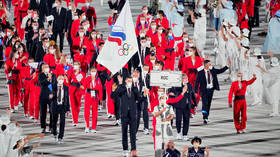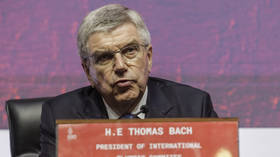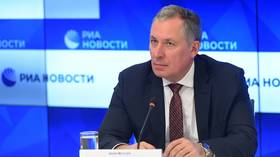IOC to explore Asian offer for Russian athletes

The International Olympic Committee (IOC) will consider a proposal by the Olympic Council of Asia (OCA) to allow Russian and Belarusian athletes to compete at events held under its auspices. The announcement was made as part of a declaration from the 11th Olympic Summit issued on Friday.
According to the IOC, summit participants “unanimously agreed” to further explore a proposal by the OCA, which would “facilitate the participation of athletes from Russia and Belarus in competitions in Asia under its authority, while respecting the sanctions in place.”
“This initiative [is] to be discussed in the next round of IOC consultation calls with the IOC Members, the athletes’ representatives, the International Federations and the National Olympic Committees,” added the IOC declaration.
Russian and Belarusian athletes are currently sidelined from a large number of international tournaments following an IOC recommendation issued on February 28.
Friday’s announcement appears to be a step forward in their hopes of being cleared in time for qualifying events leading up to the Paris 2024 Olympics.
However, the IOC statement noted that certain “sanctions” imposed on Russia and Belarus because of the conflict in Ukraine would remain in place.
That includes the two countries being deprived of the right to host major international sporting events, as well as their national symbols – including flags and anthems – being prohibited at sports events and meetings.
The IOC said the sanctions were still supported by “the vast majority” of participants at the summit, which was held at Olympic House in Lausanne, Switzerland.
The IOC has argued that its measures against Russia and Belarus in the wake of Moscow’s military campaign in Ukraine are divided into two categories – “sanctions” for the political leadership and “protective measures” for the athletes themselves.
The IOC claims that suspending Russian and Belarusian athletes ensures the integrity of competitions is maintained, while shielding sportsmen and women from the two countries from supposed hostility they would face when competing abroad.
IOC president Thomas Bach admitted again this week that the organization was “acting against our own values and our mission” by recommending that international sports federations do not invite Russian and Belarusian athletes to events.
The IOC declaration on Friday noted recent comments by French President Emmanuel Macron, who asserted that politics and sport should not mix.
A resolution to the dilemma has been proposed by the OCA and its acting president, India’s Randhir Singh.
“In the course of the debate, the Acting President of the Olympic Council of Asia (OCA) stated that, on the Asian continent, the reasons for the protective measures no longer exist,” said the IOC.
It added that representatives from other international federations had “welcomed this initiative,” and that “for some IFs and for hosts of their competitions, the same reasoning would apply, and that therefore there should not be a one-size-fits-all solution.”
“Each IF should carefully evaluate for its sport whether the reasons for the protective measures still exist,” it said.
The authorities in some sports, most notably tennis, have allowed Russian and Belarusian athletes to continue to compete at international tournaments under neutral status.
Elsewhere, however, Russian and Belarusian athletes and teams have faced blanket bans on their participation.
Various Russian officials have accused the IOC of discrimination, decrying the sanctions as politically motivated.
It has also been pointed out that athletes from other nations – not least the US and its NATO allies – have not faced similar bans when their governments launched foreign military campaigns.














